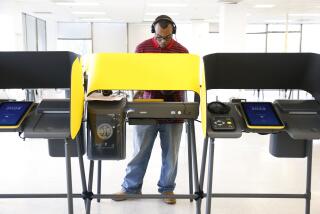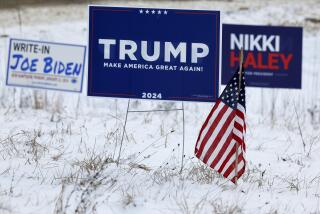The Primary Lesson Is That Unease Persists : Clinton prevails but so does widespread voter doubt
- Share via
Today, in a national election that in many respects prefigures the U.S. showdown in November, British voters will be asked to decide whether they want a new government. The polls there show that the electorate is unhappy about the choices and is of uncertain mind about the future. That’s very much the case here, too. The contradictory results of Tuesday’s primary voting in New York and elsewhere seem to once again prove Churchill’s wisdom that democracy is indeed the worst system ever devised--except for all the others.
And thus the nation has results that, on the Democratic side, clearly favor Arkansas Gov. Bill Clinton but continue to show the porous nature of his support; on the Republican side, a sitting President won decisively but continues to be plagued by a small but persistent protest vote in primaries where he is challenged.
Nowhere is voter dissatisfaction more measurable than in turnout. Fewer than 1 million Democrats cast ballots Tuesday in New York, down more than 500,000 from 1988, when the primary ballot there included then-Massachusetts Gov. Michael S. Dukakis, the Rev. Jesse Jackson and Sen. Albert Gore Jr. of Tennessee. And this time around, almost a fifth of New York voters said they voted more in protest than support.
DISAPPEARING ACTS: Certainly politicians everywhere are feeling the wrath and alienation of voters. Sen. Timothy E. Wirth (D-Colo.) Tuesday added his name to a growing list of lawmakers who are not seeking reelection. So far 45 House members and seven senators are packing it in. The fact that many incumbents are not returning to Capitol Hill is no tragedy, of course. But it serves no useful purpose when hard-working members with integrity, like Wirth and Sen. Warren B. Rudman (R-N.H.), throw their hands up in frustration at government gridlock, political stalemate and Capitol Hill scandals that wrongly paint the lot of them as crooks and recreants.
REAPPEARING ISSUES: Certainly the press has played a role in this public perception that there’s nothing good to be said about American politics and its practitioners. Americans want and have a right to know about bounced checks from the House bank, about allegations that some members of the President’s family have taken financial advantage of their connections, about the oh-so-carefully navigated answers of Clinton to questions about his past, about the contrast between former California Gov. Edmund G. (Jerry) Brown Jr.’s anti-big-money rhetoric today and his pro-big-money fund raising as California Democratic Party chairman.
But the press has also reported--although perhaps not in the depth it should--about the ideas and programs and records behind the candidates. Voters who have been following the campaign know, for example, about Brown’s flat tax proposal, know that Bush’s biggest strength continues to be in foreign policy, know that Clinton has a longstanding commitment and specific ideas about how to improve public education.
And for all the continuing questions about Clinton’s personal integrity, and there are several, he remains the presumptive Democratic nominee not only because of his huge advantage in delegates but because of his exhibition of tenacity. He has been bloodied--perhaps, in the long run, fatally--but it seems clear that Clinton, if not his hoarse voice, is in this race, as he put it, “until the last dog dies.”
That’s a long time away--almost as long as the absurdly late and pragmatically irrelevant California primary on June 2. Maybe by the next pres- idential election year, state leaders in Sacramento can move up the primary date by acting to put the voters’ interests ahead of their own interests. And yes, we can always hope. As this election year has already proven, nothing’s totally lost with hope and nothing’s won without it.
More to Read
Get the L.A. Times Politics newsletter
Deeply reported insights into legislation, politics and policy from Sacramento, Washington and beyond. In your inbox twice per week.
You may occasionally receive promotional content from the Los Angeles Times.










